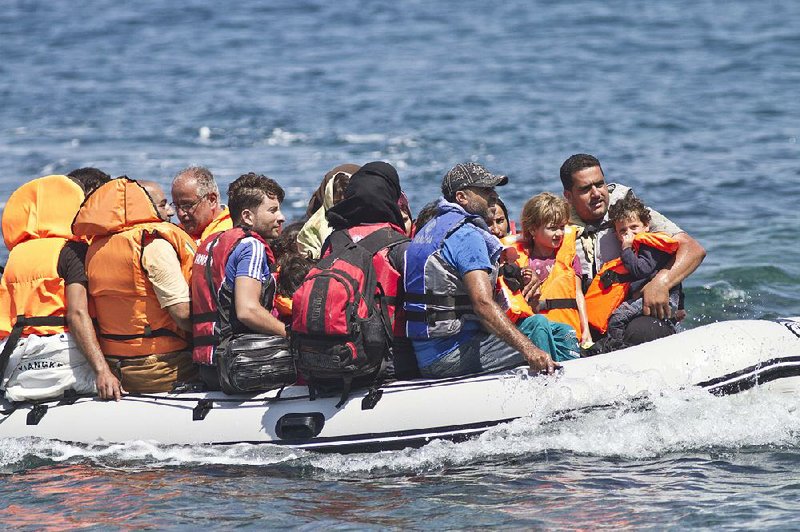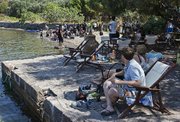CALAIS, France -- The United Kingdom and France on Thursday announced tougher security tools to guard the Channel Tunnel, a new joint police command to target human traffickers and $11.2 million in funds from the British government to help asylum seekers -- and send others back home.
The measures are aimed at overcoming diplomatic tensions around the French port of Calais, a flash point in a European summer marked by unusually large waves of migrants. The moves focus more on policing than humanitarian efforts.
Meanwhile in southeastern Europe, Macedonia declared a state of emergency Thursday as it ramped up security on its border with Greece, stranding thousands of foreigners in a dusty field.
The government said it was deploying troops to stem a surge of people from the Middle East, Asia and Africa traveling across the Balkans to reach western Europe.
In Calais, British Home Secretary Theresa May and French Interior Minister Bernard Cazeneuve visited the tunnel and announced plans for a "substantial" increase of security guards, higher fences, surveillance cameras, floodlighting and infrared detection technology.
Since the start of June, at least 10 people have died trying to sneak through the Channel Tunnel to the U.K., and countless others have slipped through undetected. The U.K. and France have accused each other of not doing enough to manage the migrants.
An estimated 3,000 people are camped in Calais with more arriving and leaving daily, drawing intense political attention in the U.K. Hundreds of thousands of refugees and others have arrived in Europe, many traveling to Greece from Turkey and traveling through the Balkans to northern countries, such as Germany.
May insisted on the importance of distinguishing between refugees fleeing war or persecution and people arriving illegally to seek better economic prospects.
"It's a problem that starts elsewhere in the world with migrants trying to come abroad with organized criminal gangs," she said Thursday.
The U.K. will increase monitoring of other North Sea ports as the crackdown on Calais pushes migrants to other potential departure points, she said.
The two countries announced a new joint police command center to coordinate intelligence to disrupt migrant-trafficking gangs.
The overall cost of the measures was not disclosed. But a joint statement said the U.K. would provide an additional $5.6 million a year for the next two years for identifying and protecting the most vulnerable travelers, particularly women and children -- and on sending economic migrants home.
British border guards will meet with migrants to provide "a more dissuasive and realistic sense of life for illegal migrants in the U.K.," the declaration said.
Cazeneuve said French authorities have dismantled 19 trafficking networks this year.
There are now about 400 surveillance cameras, 200 French guards and 500 other French security forces surrounding the area near the tunnel entrance, British officials said.
Britain has financed 13-foot fences that Eurotunnel spokesman Romain Dufour said have reduced considerably fence-rushing by migrants.
United Nations High Commissioner for Refugees Antonio Guterres on Thursday praised the new measures helping migrants in Calais and targeting traffickers, and urged more "legal avenues for people in need of protection to come to Europe," particularly from war zones.
Migrants in Calais, however, met Thursday's announcements with skepticism, noting that as long as they hear of success stories in the U.K., they will continue to risk the journey. Some staged a protest on a highway near a camp, while others continued to try to sneak onto trucks traveling across the channel.
Kamil, a Syrian man at a Calais camp, said the British investment in security "is a waste of money."
"Even if they put fences in the water, they're not stopping us," said Kamil, who spoke on condition that only his first name be used out of fear of being arrested.
He was joined by two Syrian friends who said they would walk two hours to the tunnel and try again.
"I'll call when I make it to England," he said.
waiting, then stranded
Not far from the Macedonian border city of Gevgelija, thousands of people were stranded in Greece by the emergency declaration. Many had planned to catch trains from Gevgelija that would take them to the Serbian border on their way to Hungary, which is building a fence to try to keep them out.
A police helicopter hovered nearby and officers in armored vehicles watched the crowd.
Macedonian police spokesman Ivo Kotevski said both police and the army will control the 30-mile stretch of the border in order to stop a "massive" influx crossing from Greece.
"This measure is being introduced for the security of [Macedonian] citizens who live in the border areas and better treatment of the migrants," he said.
The measure could create a huge backlog of migrants on the Greek side of the border, from which an estimated 2,000 per day have been illegally crossing into Macedonia.
Hundreds of migrants traveling from the Greek island of Kos planned to move into Macedonia in the next few days.
Hundreds more people, including many women with young children, joined the group as the night fell. They lit fires as they prepared to spend the night out in the open near the Greek border town of Idomeni. Some sat on railway tracks, blocking trains.
Small groups who tried to cross into Macedonia were escorted back to the border.
"We can't believe that we are here, from this morning," said Ahmet Husa of Syria. "People from Syria escaped from war, escaped death and we want to see our future in Europe. We need this road to see our future."
Until now, the border has been porous, with only a few patrols on each side. Sealing it would disrupt the so-called Balkan corridor for migrants who start in Turkey and take boats to Greece or walk to Bulgaria, then make their way through Macedonia or Serbia en route to the wealthier countries of the European Union.
Almost 39,000 migrants, mostly Syrians, have been registered passing through Macedonia in the past month, double the number from the month before.
Farther north, Slovakia has been under fire for its preference to grant asylum to migrants who are Christians.
Council of Europe Secretary General Thorbjorn Jagland says in a Thursday statement on Twitter: "Refusing refugees on the grounds of their religion is blatant discrimination," adding "Slovakia should reverse its position."
Slovakia, the Czech Republic, Hungary and Poland in June blocked a European Union plan for member countries to take set numbers of refugees arriving in Italy and Greece. The four said they were ready to help but only on a voluntary basis.
Slovakia later announced it was ready to accept 100 Christians from Syria and temporarily provide shelter for 500 migrants, who have applied for asylum in Austria. Officials did not say whether the 500 could include non-Christians.
Germany, one of the countries that has seen the highest numbers of asylum seekers, has expressed anger that countries such as Italy and Greece are ignoring the rule that refugees must apply for asylum in the first EU country they arrive in. As a result, many refugees travel straight to Germany and Sweden.
On Thursday, Thomas de Maiziere, Germany's interior minister criticized Europe's failure to tackle the refugee crisis, saying the principle of passport-free travel that exists across much of the continent is at risk.
De Maiziere said he wants to see a series of measures to prevent migrants traveling unchecked through Europe, including the creation of waiting zones in Greece and Italy, common definitions of asylum and safe countries of origin, and the linking of aid to countries' willingness to take their citizens back.
"It's unacceptable for the European institutions to keep working at the speed they have," he told reporters after a meeting with his French counterpart in Berlin.
Asked about Hungary's effort to build a 13-foot high fence along its border with Serbia, de Maiziere said that "if other countries would abide by the law, then Hungary wouldn't build a fence."
Germany has been largely welcoming to the tens of thousands of refugees arriving there each month; authorities have predicted the country will see a total of 800,000 arrivals this year.
Information for this article was contributed by Elaine Ganley, Danica Kirka, Dusan Stojanovic, Frank Jordans and staff members of The Associated Press.
A Section on 08/21/2015


